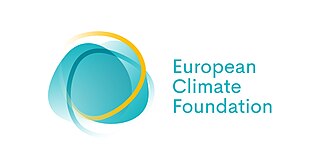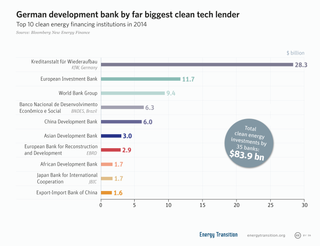
The World Economic Forum (WEF), based in Cologny, Geneva Canton, Switzerland, is an international NGO, founded on 24 January 1971. The WEF's mission is stated as "committed to improving the state of the world by engaging business, political, academic, and other leaders of society to shape global, regional, and industry agendas".

The Global Environment Facility (GEF) was established on the eve of the 1992 Rio Earth Summit to help tackle our planet's most pressing environmental problems. The GEF unites 184 countries in partnership with international institutions, civil society organizations (CSOs), and the private sector to address global environmental issues while supporting national sustainable development initiatives. Since 1992, the GEF has provided close to $20.5 billion in grants and mobilized an additional $112 billion in co-financing for more than 4,800 projects in 170 countries. Through its Small Grants Programme (SGP), the GEF has provided support to nearly 24,000 civil society and community initiatives in 133 countries.
ActionAid is an international non-governmental organization whose stated primary aim is to work against poverty and injustice worldwide.
The European Cultural Foundation (ECF) is a Netherlands-based independent cultural foundation. Its mission is to “make a tangible impact on civil society, citizen initiatives, public opinion and policy proposals to combat the fragmenting forces jeopardising peace and social progress in Europe”.

The Space Telescope – European Coordinating Facility (ST-ECF) was an institution which provided a number of support and service functions primarily for European observers of the NASA/ESA Hubble Space Telescope (HST). It was established in 1984 by the European Space Agency (ESA) and the European Southern Observatory (ESO), and was located at the ESO headquarters in Garching bei München, Germany. The ST-ECF ceased operations on 31 December 2010.

European Cyclists' Federation (ECF) is an umbrella federation for national cycling organizations throughout Europe.
Business action on climate change includes a range of activities relating to global warming, and to influencing political decisions on global-warming-related regulation, such as the Kyoto Protocol. Major multinationals have played and to some extent continue to play a significant role in the politics of global warming, especially in the United States, through lobbying of government and funding of global warming deniers. Business also plays a key role in the mitigation of global warming, through decisions to invest in researching and implementing new energy technologies and energy efficiency measures.

Velo-city is a series of cycle planning conferences that started in 1980 in Bremen. The Velo-city 1980 also inspired the founding of the European Cyclists' Federation (ECF) in 1983. The conferences are one of the world's primary forums for the exchange of bicycling expertise.
This is a list of climate change topics.
Institute for European Environmental Policy (IEEP) is an independent, not for profit policy studies institute, a green think tank and a leading centre for the analysis and development of environmental policy in Europe and beyond. It has a strong reputation among national and European policy-makers and non-governmental organisations. The Institute is based in Brussels with a branch office in London and a network of partners in other countries, which are particularly strong in the member states of the EU. These include universities, environmental and professional associations in a range of sectors, research institutes and consultancies. IEEP brings a non-partisan analytical perspective to policy questions, engaging in both pressing short-term questions and long-term strategic studies.

The European Climate Foundation, or the ECF, is an independent philanthropic initiative working to help tackle the climate crisis by fostering the development of a net zero emissions society at the national, European and global level. Its aim is to promote climate and energy policies that press Europe and other key global players to achieve a net zero greenhouse gas emissions society by 2050. The ECF also works to ensure Europe plays a front-runner role in demonstrating that the pathway towards this society is fair, achievable and desirable.

Manfred Neun is a German entrepreneur and a key figure in cycling advocacy. He is the former president of the European Cyclists' Federation and actively advocates for cycling and utility cycling in Europe and abroad.

Gunhild Anker Stordalen is a Norwegian physician and environmental advocate. She is the founder and president of EAT Foundation, the co-founder and chair of the philanthropic Stordalen Foundation, the CEO of GreeNudge and serves on the board of several commercial and nonprofit organizations. She has been engaged in public debate on issues like climate change and public health and has focused on transforming the global food system.

Climate finance is “finance that aims at reducing emissions, and enhancing sinks of greenhouse gases and aims at reducing vulnerability of, and maintaining and increasing the resilience of, human and ecological systems to negative climate change impacts”, as defined by the United Nations Framework Convention on Climate Change (UNFCCC) Standing Committee on Finance. The term has been used in a narrow sense to refer to transfers of public resources from developed to developing countries, in light of their UN Climate Convention obligations to provide "new and additional financial resources", and in a wider sense to refer to all financial flows relating to climate change mitigation and adaptation.
The Majuro Declaration is an initiative of the Pacific Islands Forum, which was signed on 5 September 2013 at Majuro in the Marshall Islands during the 44th Pacific Islands Forum summit. At the summit the leaders of the Pacific Islands Forum nations recognised the need for strengthened national systems to plan for, access, deliver, absorb and monitor climate change and for donor countries to continue to simplify and harmonise their assessment, implementation and reporting processes for financing projects directed to climate change adaptation, mitigation and risk reduction.

Global Goals Week is an annual week-long event in September for action, awareness, and accountability for the Sustainable Development Goals. It was first held in 2016. It is timed to coincide with the UN General Assembly "High-level Week" in New York. The week includes many events, summits, conferences, forums, workshops, pledges, etc. in New York but also around the world. It usually runs alongside Climate Week NYC, the annual conference of Goalkeepers, Bloomberg Global Business Forum and many other high-level events.
Climate change vulnerability is an assessment of vulnerability to climate change used in discussion of society's response to climate change, for processes like climate change adaptation, evaluations of climate risk or in determining climate justice concerns. Climate vulnerability can include a wide variety of different meanings, situations and contexts in climate change research, but has been a central concept in academic research since 2005. The concept was defined in the third IPCC report as "the degree to which a system is susceptible to, and unable to cope with, adverse effects of climate change, including climate variability and extremes".










